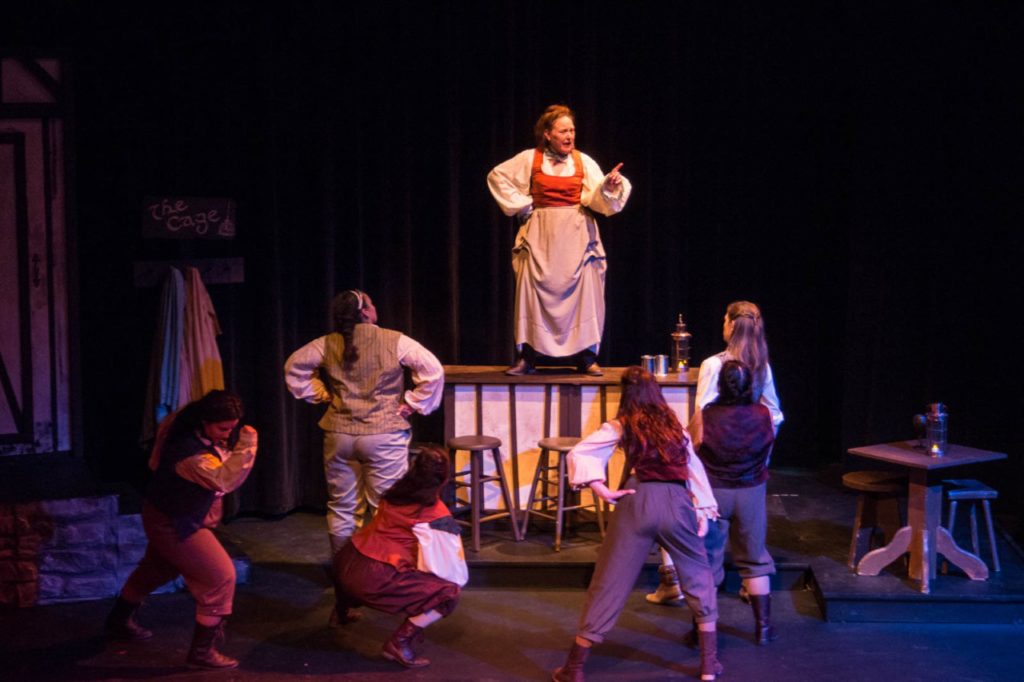Fine ensemble work gives Miss Shakespeare its punch

Book and lyrics by Tracey Power
Music co-written with Steve Charles
Three Sisters Theatre Company
Directed by Bronwyn Steinberg
It is more than 350 years since women were forbidden to perform on English stages. The ban was finally lifted after the Restoration in 1660 when King Charles II issued a patent announcing:
forasmuch as many plays formerly acted do conteine severall prophane, obscene and scurrilous passages, and the women’s parts therein have been acted by men in the habit of women, at which some have taken offense…we doe likewise permit and give leave that all the women’s parts to be acted in either of the said two companies may be performed by women…
During the timeframe in which Miss Shakespeare is set, until some 44 years after William Shakespeare’s death, all female parts were played by men and boys dressed as women. So, how can a creative and rebellious woman for whom “life is so much more interesting in [her] head” get in on the act?
As playwright and lyricist Tracey Power and co-composer Steve Charles see it in Miss Shakespeare, which premiered in 2015, performances must be by an all-female company, dressing as men, redressing as women to perform roles written for women.
The result is an entertaining musical with occasional dips into childish humour, several moving moments and an overall sense of enjoyment. An interesting mix of fact and fiction, it is a show that gains in quality and momentum as it progresses.
This is in large part because of the fine performances from the ensemble on stage. The members of the cast of Three Sisters Theatre Company are equal parts energy and empathy and in tune with each other throughout.
Although director Bronwyn Steinberg’s concept in the opening scene is more confusing than dramatic, the actors soon dissipate the fog by clear characterizations and fine singing. Particularly noteworthy are such numbers as the moving Tumbling as sung by Robin Guy and the group’s rendering of Passion.
Rachel Eugster, in the dual role of Quiney the bar owner and William Shakespeare, keeps the storyline on track, while Leah Cogan as Judith, the Bard’s youngest daughter, leads the resistance movement with her troupe of actors. Tamara Freeman is bubbly, determined and full of fight as Isabel Loxley and Natalie Fraser adds the voice of caution and reason as Susanna, Judith’s married older sister.
Laura Hall as Margaret — still a virgin after nine years of marriage — Guy as Katherine — who has buried 14 babies — and Andrea Massoud as Hanna — born of unwed parents — represent other aspects of the difficulties facing women in the 16th century.
David Magladry’s minimalist set and bass player Roxena Pearl’s double duty in providing sound effects are sufficient in this setting, as is having music for this chamber musical, under musical director Wendy Berkelaar, from piano and double bass only.
The Three Sisters production of Miss Shakespeare continues at the Gladstone to June 2.
Director: Bronwyn Steinberg
Musical director/pianist: Wendy Berkelaar
Set/lighting: David Magladry
Costumes: Vanessa Imeson
Cast:
Quiney……………………………………Rachel Eugster
Isabel Loxley……………………………..Tamara Freeman
Katherine Rose……………………………Robin Guy
Margaret Moore…………………………..Laura Hall
Hanna Storley…………………………….Andrea Massoud
Judith Shakespeare……………………….Leah Cogan
Susanna/Bess……………………………..Natalie Fraser
Double bass……………………………….Roxena Pearl